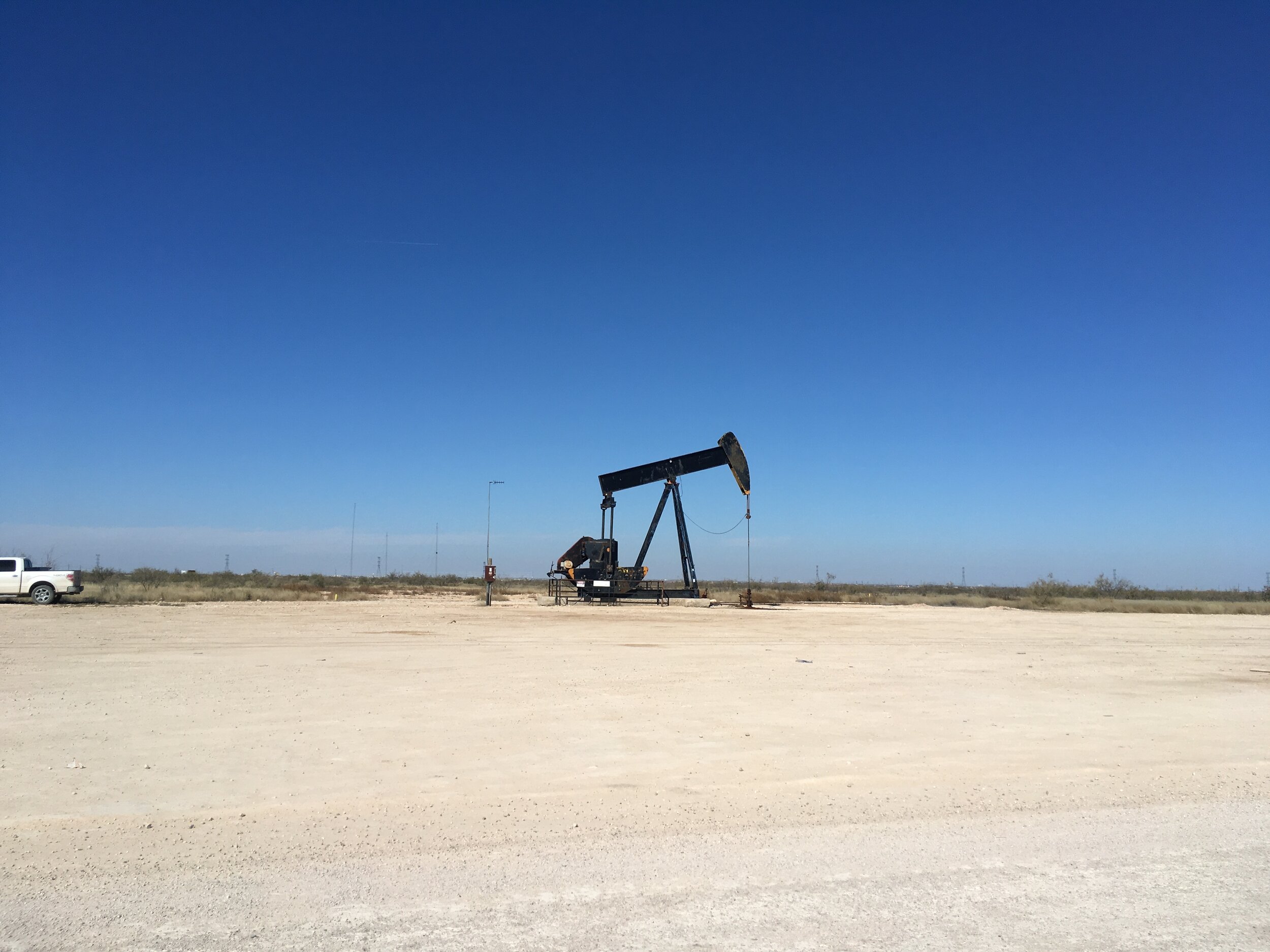
Texas Permian Basin, 2018 (PC: K Griesbach)
Forthcoming
“Positioning Stories: Accounting for Insecure Work.” American Sociological Review
Prior research finding that workers tend to individualize insecurity is important, but incomplete. How do structural features of work shape workers’ interpretations, or the stories that they tell? This paper draws on 120 interviews with four groups of workers who confront temporal and spatial instability, or positional uncertainty, including Texas-based agricultural and oilfield workers and NYC-based adjunct and delivery workers. I find that rather than adopting one dominant individualizing story, workers instead move between positioning stories to interpret their work’s particular structural features, combining individualistic and structural frames. Depending on the specific tempo and geography of their work, workers account for spatial instability in stories about sacrifice and self-improvement; they interpret temporal instability in stories about addiction and the burden of time passing without progress. Workers combine these stories with narratives highlighting meaning and exploitation, respectively. Structural precarity impedes a cohesive narrative by disrupting identities and life projects, but it also undermines the credibility of individualistic accounts. The resulting narrative fragmentation may inspire a wide range of responses, from resignation to contestation.
“Space and Inequality in Precarious Work: Thinking with and beyond platforms.” Sociology Compass
Platform-based gig work illustrates a broader erosion of the spatial boundaries of work. While geographers have long theorized space as an integral part of capitalist work processes and social life, sociological research has often treated space as a backdrop for work processes rather than an active process shaping the social world, contemporary work, inequality, and resistance. However, pioneering work in both urban and rural sociology emphasizes the central role place plays in social life and inequality. This review synthesizes these insights to theorize space, place, and inequality in precarious work, identifying key spatial continuities between platform labor and other forms of precarious work. I identify common throughlines across disciplines: the intertwining of space, place, and social relations and the relevance of space and place for understanding inequality. Next, I relate spatial theories of capitalist development to contemporary precarious work. Finally, I suggest 3 promising avenues for scholars to incorporate space into research on contemporary work and inequality today: analyzing how inequalities across race, class, and gender intersect with the spatial features of new and “old” work structures; examining how contemporary work processes are reshaping rural and urban landscapes; and identifying the spatial practices of contemporary organizing and resistance.

New York, 2017 (PC: K Griesbach)
Selected Publications (for all publications, see my CV)
Karnes City, Texas, 2021 (PC: K Griesbach)
“Unequal Reach: Cyclical and Amplifying Ties among Agricultural and Oilfield Workers in Texas.” 2022. Griesbach, Kathleen. Work and Occupations 49(1): 3-44.
What kinds of ties do agricultural and oil and gas workers form in the field, and how do they use them later on? Why do they use them differently? Scholarship highlights how weak ties can link people to valuable information, while strong ties can be critical for day-to-day survival. Yet many mechanisms affect how workers form and use social networks over time and space. Drawing on 60 interviews and observations with agricultural and oilfield workers in Texas, I examine how both groups form strong ties of fictive kinship when living together in the field far from home—pooling resources, sharing reproductive labor, and using the discourse of family to describe these relationships. Then I examine how they use these ties very differently later in practice. Oilfield workers often use their fictive kin ties to move up and around the industry across space, time, and companies: amplifying ties. In contrast, agricultural workers renew the same strong ties for survival from season to season, maintaining cyclical ties. The comparison highlights how industry mobility ladders, tempos, and geographies affect how workers can use their networks in practice. While both agricultural and oilfield workers become fictive kin in situations of intense proximity, structural differences give their networks unequal reach.
“Algorithmic Control in Platform Food Delivery Work.” 2019. Griesbach, Kathleen, Adam Reich, Luke Elliott-Negri and Ruth Milkman. Socius 5: 1-15.
Building on an emerging literature concerning algorithmic management, this article analyzes the processes by which food delivery platforms control workers and uncovers variation in the extent to which such platforms constrain the freedoms—over schedules and activities—associated with gig work. Drawing on in-depth interviews with 55 respondents working on food delivery platforms, as well as a survey of 955 platform food delivery workers, we find that although all of the food delivery platforms use algorithmic management to assign and evaluate work, there is significant cross-platform variation. Instacart, the largest grocery delivery platform, exerts a type of control we call “algorithmic despotism,” regulating the time and activities of workers more stringently than other platform delivery companies. We conclude with a discussion of the implications of the spectrum of algorithmic control for the future of work.
Brownsville, Texas, 2021 (PC: K Griesbach)
“Dioquis: Being without Doing in the Migrant Agricultural Labor Process. 2020. Griesbach, Kathleen. Ethnography 21(4):481-505.
Being on call without being on the clock is an important but underappreciated source of insecurity among low-wage workers. Drawing on fieldwork with 20 agricultural workers of the Texas-Mexico border region, this paper identifies several stages where workers are made to wait without pay and links these stages to economic precarity. These intervals occur at the local bus station, a hub for recruitment and departure, at home in both the US and Mexico, during travel to distant work sites, and in seasonal lodging. Workers use the Spanish colloquial term ‘dioquis’, which they define as ‘being without doing’, to describe such uncertain periods of waiting which are required for them to work. Through dioquis, a liminal state, employers displace industry risk onto workers, leading to long-term instability. Expanding the implications of dioquis, the paper reveals the significance of temporal uncertainty for the marginalized across other contexts of work and waiting.

Texas Permian Basin, 2018 (PC: K Griesbach)


